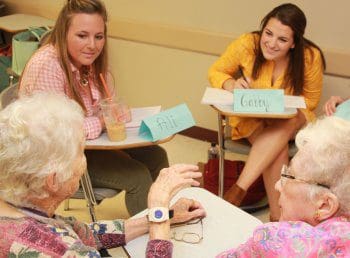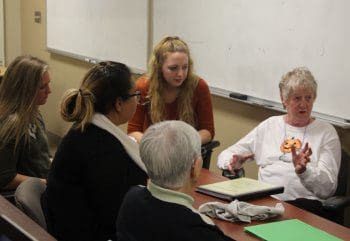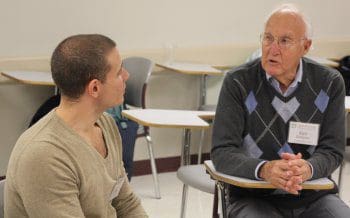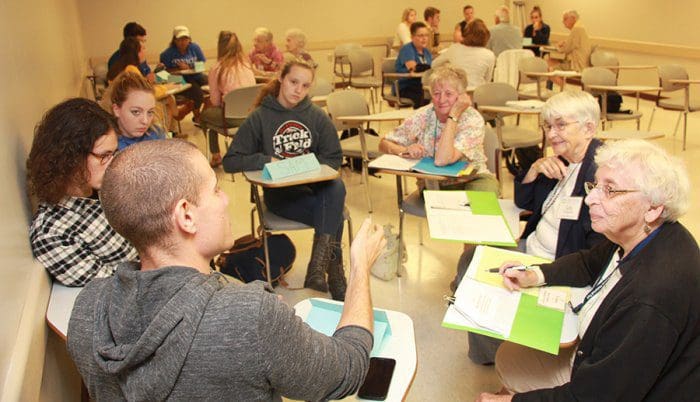Presidential election brings together students of all ages
It is safe to say that for all of us, the 2016 presidential election will go down as a contest unlike any we have seen before. During the 55 minutes of Dr. Kathleen Donovan’s “Campaigns and Elections” class at St. John Fisher College, the factors that have made this race so uniquely contentious—from email hacks to the rise of fact-checking and an increasing polarization among the two major political parties—are discussed by students while they compare and contrast the issues and campaign strategies of today with those throughout 226 years of United States history.

The two dozen college students—most of whom will be casting their vote for United States President for the first time—are joined by some special guest classmates who can provide additional context to their study of the American political system. Through a long-standing relationship between St. John Fisher College and St. John’s, a group of ten residents from St. John’s Meadows and Brickstone by St. John’s have joined class discussions several times this fall. According to Dr. Donovan, having residents join the class has led to a much more informed conversation on politics. “For a lot of students, this is the first election they have paid any attention to, so they have no reference point,” she said. “Having citizens who have experienced ‘normal’ elections as an adult is incredibly helpful.”
The group of St. John’s participants travel by bus to join Fisher students in their classroom at Pioch Hall. After three matriculating students present the highlights from selected reading assignments that are also completed by the visiting students, they break into small groups to do something that has not happened all that often during the Election of 2016: discuss the important issues of our times in a civilized manner.

Elizabeth “Bizza” Milliken holds court in one of these small forums. She explains to young 19 and 20- year-olds how she—much like candidate Hillary Clinton—faced resistance from her male colleagues as she rose through the ranks throughout her career as an executive. Bizza became very active in politics after retirement—first as volunteer coordinator in Congresswoman Louise Slaughter’s campaign and later as an inspection coordinator through the Monroe County Board of Elections. She admits that outside of handing out literature in support of George McGovern during the campaign of 1972, she never became intimately involved in the political process until later in life. She has found her interactions with the Fisher students thus far to be thrilling. “There is a level of interest from these students that is really impressive,” says Bizza, who lives with her fellow classmate and husband Jim in a cottage at St. John’s Meadows. “You don’t get the feeling that they are doing this just for the (college) credit.”
Read a special version of this article at Next Avenue, a part of the PBS system
If any of the ten St. John’s participants came into this project with preconceived notions of the apathetic millennial who is too self-involved to know or care about the real issues involved in this election, those opinions quickly dissipated. Similarly, Meadows and Brickstone residents have done their part to change stereotypes of older voters in the eyes of their younger classmates. Bizza talks about discussing the presidential debates in real time with family members through group text messages. Others can tell Fisher students what it has been like to experience a shift in how election news is received—from traditional mass media like newspaper and television to targeted online sources and social media platforms.

As another group’s discussion turns to the issue of affordable health care, one Brickstone resident is uniquely qualified to speak on the subject. A retired physician, Dr. Ken Dodgson knows that the success of the nation’s health care system goes far beyond the contrasting visions of two Presidential candidates. He tells students that they themselves will take on this great responsibility. “If we do anything to cut down on health care costs, it is going to be your generation, and the generation after you, that takes those steps,” he says. Dr. Dodgson’s words on the importance of preventative medicine and taking individual responsibility for eating right, exercising, and remaining mentally active sparks further conversation about how much economic factors affect the overall health of our society as well as an examination on whether or not government policies should dictate more healthy behaviors of citizens.
Dr. Donovan says that she has gotten all that she had hoped for from this collaboration. She sees that her students value the opportunity to dive deeper into the subjects that matter to them while becoming exposed to informed perspectives on issues that have yet to affect their daily lives. “I know that they really enjoy having some time to discuss difficult issues in a way we don’t normally in class,” she says.
The ultimate goal of any type of intergenerational programming is to create an environment where participants of all ages leave with a meaningful experience. This is why St. John’s Meadows resident Lucy Donofrio makes sure to take advantage of any opportunity she can to connect with young people. Legally blind, she says that being involved in programs like this one with Fisher students—as well as the collaborative with Nazareth College—helps keep her better connected with the community-at-large. “You can feel isolated as you get older,” says Lucy, who majored in Journalism in college before starting a long career as a schoolteacher. “I join these classes to keep up with the times and to keep my mind sharp.”

For her part, Lucy can contribute her viewpoints from a lifetime of Presidential elections. She has vivid memories of another hard fought election from eight decades ago. “I remember seeing WPA (Works Progress Administration) and NRA (National Rifle Association) signs everywhere I looked,” said Lucy, as she recalled the Election of 1936 between incumbent President Franklin Roosevelt and Republican challenger Alf Landon. Lucy and her peers from St. John’s hope that these perspectives on campaigns and the issues that drive them will be helpful to the Fisher students whose thoughts on the political process are just beginning to take shape.
Bizza Milliken looks forward to each class and the opportunity to interact with these bright college students—some of whom have already volunteered in political campaigns during school breaks. She feels that the age gap is much less of a factor in these political discussions than you might think. “These young people don’t talk to me like I’m an old lady,” she says with a laugh.
“It is just citizens having an informed conversation about politics,” says Dr. Donovan. “Imagine that!”
